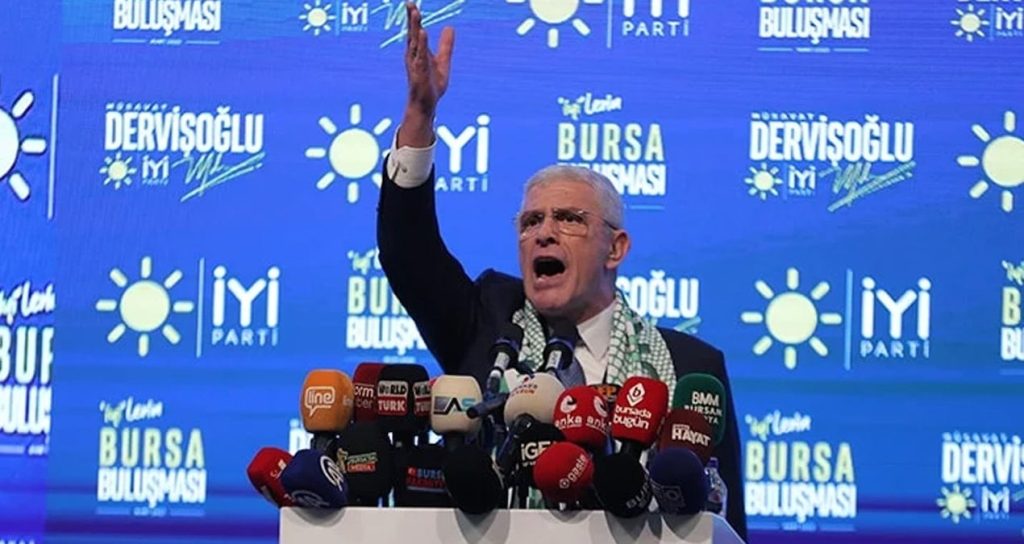In a recent address, Musavat Dervişoğlu, Chairman of the GOOD Party, expressed serious concerns regarding Turkey’s political landscape, particularly focusing on the actions of President Recep Tayyip Erdoğan. Dervişoğlu criticized Erdoğan’s handling of various national issues, including allegations of terrorism links and the need for legal reforms due to PKK demands. The speech was delivered during a meeting following a tour in Edirne, shedding light on pressing issues that could influence Turkey’s international relations and internal governance.
| Article Subheadings |
|---|
| 1) Concerns Over President Erdoğan’s Speech |
| 2) Internal Party Dynamics |
| 3) Alliances and Election Strategy |
| 4) The PKK and Terrorism Debate |
| 5) Call to Action and Future Implications |
Concerns Over President Erdoğan’s Speech
During his remarks, Musavat Dervişoğlu emphasized the gravity of President Erdoğan’s upcoming speech set to address the nation’s issues concerning security and governance. He raised alarms about comments made regarding fires in Turkish villages, asserting that these sentiments could jeopardize Turkey’s reputation on international platforms like the European Parliament and the United Nations. In a rather pointed rhetorical question, he queried whether such a speech could provide foreign deputies grounds to question Turkey’s integrity. The chairman’s citation of a “white Taurus” reference added to the urgency of the message, implying systematic neglect of rural issues that are painting a grim picture of Turkey’s internal stability.
Internal Party Dynamics
Following his speech in Edirne, Dervişoğlu shed light on internal GOOD Party dynamics and criticism of Erdoğan’s administration. He asserted that the government’s handling of legal frameworks appears to cater to terrorist organizations, particularly the PKK. Dervişoğlu discussed the implication that supporting legal changes would essentially threaten the Turkish Grand National Assembly—claiming this would dilute national interests. He indicated that any concessions made to such groups would not only be immoral but politically perilous for Turkey. The emphasis on holding the government accountable resonated within party lines, underscoring the growing dissatisfaction among various factions regarding Erdoğan’s policies.
Alliances and Election Strategy
In discussing the forthcoming presidential elections, Dervişoğlu acknowledged that the current political system necessitates forming alliances, however, he underlined that such partnerships should be with the populace rather than with undesirable political factions. He characterized the prevailing system as “ceberrut,” suggesting that it imposes overly stringent frameworks limiting democratic choices. The emphasis on aligning with the will of the people serves as a mantra for the party, indicating that if the citizens appreciate their policies, they would take the helm. Dervişoğlu indicated a willingness to collaborate with other opposition parties if it aligned with the nation’s best interests, though he maintained that this would be contingent on fundamental ideological compatibility.
The PKK and Terrorism Debate
The discussion took a decisive turn when Dervişoğlu addressed the long-standing controversy surrounding the PKK. He did not shy away from labeling its leader, Abdullah Öcalan, as a terrorist, emphasizing that all political discourse should acknowledge this position. This segment of his address showcased a fierce commitment to a traditionalist view regarding terrorism, which he believes is essential in forming a viable political stance. Dervişoğlu criticized the ruling party for any attempts to redefine this narrative, stating unequivocally that Öcalan’s classification as a terrorist must remain unequivocal for opportunities of dialogue to be feasible. He expressed concerns that blurring these distinctions could undermine Turkish sovereignty and national stability.
Call to Action and Future Implications
In closing, Dervişoğlu issued a clarion call, warning against complacency and urging unified action to protect Turkey’s national identity and integrity. He articulated a vision of resilience, ensuring that the nation’s goals must center around safeguarding historical consciousness and national rights. Furthermore, he criticized those in power for failing to grasp the gravity of their responsibilities, suggesting that the nation’s future hinges on recognizing and confronting the realities of the current political climate. His reassurances aimed to embolden supporters, stressing that the true direction of Turkey rests with its citizens and their shared values.
| No. | Key Points |
|---|---|
| 1 | Dervişoğlu criticized President Erdoğan’s upcoming speech for its potential to harm Turkey’s international reputation. |
| 2 | He expressed concerns about governmental policies that appear to cater to the PKK. |
| 3 | Dervişoğlu emphasized the need for parties to align with the will of the populace rather than undesirable factions. |
| 4 | He maintained that Öcalan must be classified as a terrorist in all political discussions. |
| 5 | The call to action was framed as integral to securing Turkey’s identity and direction moving forward. |
Summary
The address by Musavat Dervişoğlu reflects a crucial moment in Turkish politics, emphasizing the importance of accountability in governance and the protection of national identity amidst international scrutiny. As Turkey navigates its internal challenges and prepares for upcoming elections, the messages from opposition leaders like Dervişoğlu highlight the potential ramifications of current policies on the nation’s democratic fabric. This speech serves as a rallying cry for unity and resilience in the face of increasingly complex political challenges.
Frequently Asked Questions
Question: What are the main concerns voiced by Musavat Dervişoğlu in his recent address?
Dervişoğlu raised alarms about President Erdoğan’s speech, particularly its implications for Turkey’s international standing, the handling of the PKK situation, and the need for aligning political alliances with the people’s interests.
Question: How does Dervişoğlu perceive the relationship between his party and the current government?
Dervişoğlu critiques the government for its perceived failures, especially regarding legal reforms that seem to favor terrorist organizations, which he believes undermines Turkey’s national integrity.
Question: What role does Dervişoğlu see for alliances in upcoming elections?
He acknowledges that alliances may be necessary in the upcoming elections but stresses that these partnerships should prioritize the will of the people over cooperation with undesirable or extremist factions.


